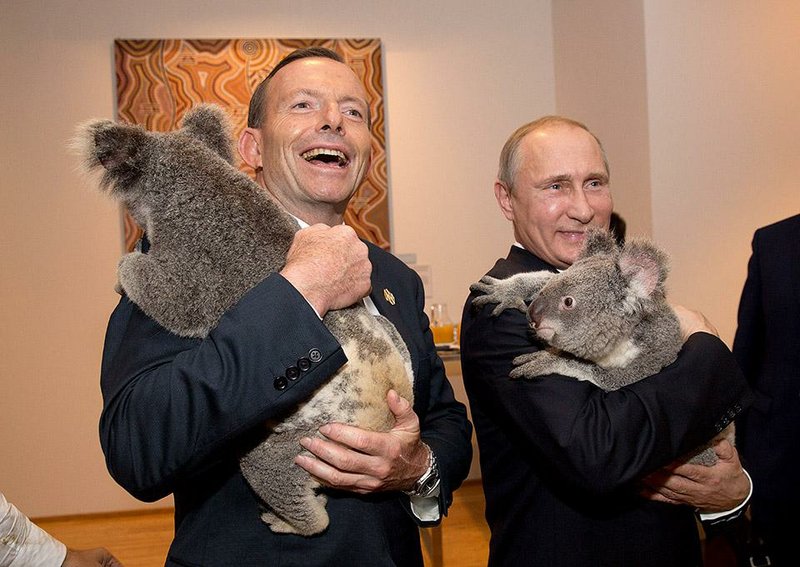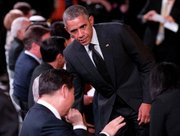BRISBANE, Australia -- Russia's President Vladimir Putin faced a chorus of criticism Saturday at a world leaders' summit, where the escalating conflict between Russia and Ukraine threatened to overshadow talk of global economics.
For the European Union, Herman Van Rompuy, the president of the European Council, said that while the Ukraine conflict was not on the agenda of the Group of 20 wealthy and developing economies, the topic would be discussed between President Barack Obama and European leaders in Brisbane ahead of an EU decision on further sanctions against Moscow.
"We will continue to use all diplomatic tools, including sanctions, at our disposal," Van Rompuy told reporters. "The EU foreign ministers will on Monday assess the situation on the ground and discuss possible further steps.
"We need to avoid a return to a full-scale conflict," he said.
Putin received a less-than-warm welcome from Canadian Prime Minister Stephen Harper when he approached Harper for a handshake.
"I guess I'll shake your hand, but I have only one thing to say to you: You need to get out of Ukraine," Harper told Putin, according to the prime minister's spokesman, Jason MacDonald.
As for Putin's reaction? "I can say that he did not respond positively," MacDonald said in an email, declining to give further details.
Putin's spokesman Dmitry Peskov confirmed the interaction.
"Indeed Harper told Putin that Russia should leave Ukraine," Peskov said by phone from Brisbane. "Putin told him that this is impossible because they are not there."
Asked about the tone of the meeting between the two leaders, Peskov said that "it was within the bounds of decency."
On Kommersant-FM radio Saturday, Peskov denied reports that Putin was going to leave the meeting earlier than planned because of the criticism. Putin will leave the meeting when "all the work is finished," the spokesman said.
At the two-day G-20 summit, European leaders called on Russia to stop supplying rebels in eastern Ukraine and warned of possible further sanctions. The summit's host, Prime Minister Tony Abbott, has accused Russia of supplying the weapons used to shoot down Malaysia Airlines Flight 17 over Ukraine on July 17, killing all 298 people on board, including 38 Australians.
Russia has repeatedly denied that it's sending armed forces into Ukraine or aiding the separatists.
In a speech to a Brisbane university audience, Obama said the United States was a leading voice in opposing Russian aggression in Ukraine, which he described as "a threat to the world."
Van Rompuy called for both sides to abide by the cease-fire agreement between Ukraine and the rebels that was signed in Minsk, Belarus, in September.
Russia must use its influence on the rebels to ensure they comply with the Minsk agreement, stop the flow of weapons and troops from Russia and withdraw Russian troops already in Ukraine, Van Rompuy said.
EU leaders were to meet with Obama today to discuss Ukraine, among other issues, Van Rompuy said.
"We will continue to use all the diplomatic tools, including sanctions, at our disposal," he said.
For his part, Putin has warned that Western sanctions against Russia could backfire.
Speaking in an interview with German ARD television broadcast Saturday, Putin said that cutting Russian access to capital markets would hurt Western exports.
"If the resources of our financial institutions are cut off, they can extend fewer loans to the Russian companies that work with German partners," he said. "Sooner or later, it will begin to affect you as much as us."
Putin acknowledged that the sanctions have hurt the Russian economy, but sought to put a brave face to that, saying that the Western punishment would encourage Russia to ease its dependence on oil and gas exports.
"The comfortable life, when all we had to do was produce more oil and gas, and to buy everything else, is a thing of the past," Putin said. "Now we must think about producing goods ourselves, not just oil and gas."
He voiced hope that the Ukrainian crisis will end and Russia-West ties will improve, adding: "We want to have normal relations with our partners, including in the United States and Europe."
Earlier, Putin spoke with German Chancellor Angela Merkel and European Commission President Jean-Claude Juncker during a late-night meeting where they discussed bilateral ties and the Russian leader gave a "detailed" explanation of his country's position on Ukraine, Peskov said.
Earlier, Merkel told reporters the situation in Ukraine "is not satisfactory."
European foreign ministers meeting Monday in Brussels will discuss expanding the list of individuals targeted as part of sanctions on Russia, she said.
Satellite image called fake
In Russia, meanwhile, state television released a satellite photograph that it claims shows a Ukrainian fighter jet shooting down Flight 17. The U.S. government has dismissed the report as preposterous and online commentators called the photo a fake.
The photo released Friday by Russia's Channel One and Rossiya TV stations purportedly shows a Ukrainian fighter plane firing an air-to-air missile in the direction of the Malaysian plane. The channels said they got the photo from a Moscow-based organization, which had received it via email from man who identified himself as an aviation expert.
The U.S. State Department on Friday dismissed the Russian TV reports as yet another "preposterous" attempt by Moscow to "obfuscate the truth and ignore ultimate responsibility for the tragic downing of MH17." It renewed a call to Moscow and Russia-backed separatists to "grant unfettered access for international investigators to the crash site."
Several bloggers said the photograph is a forgery, citing a cloud pattern to prove the photo dates back to 2012, and several other details that seem incongruous.
Mark Solonin, a Russian author who is an engineer by training, said in his blog that both aircraft looked disproportionate to the landscape and concluded that their images were crudely edited into a satellite picture.
Others noted that the commercial airliner in the photo appears to be a Boeing 767, different from the Boeing 777 shot down while flying from Amsterdam to Kuala Lumpur.
The Russian stations stood by the report, saying their source was the Russian Union of Engineers, a Moscow-based organization that previously had issued a report claiming that the Malaysian plane had been downed by Ukrainians. The organization's vice president, Ivan Andriyevsky, said in televised remarks that it received the image via email from a man who said he was a graduate of the Massachusetts Institute of Technology with 20 years of experience as an aviation expert.
Attempts to reach Andriyevsky by telephone and email on Saturday were unsuccessful.
Most of the victims of the MH17 crash were Dutch, and a preliminary report issued by Dutch crash investigators in September said the Malaysia Airlines plane was likely downed by multiple "high-energy objects," a finding aviation experts say is consistent with a missile strike.
Pro-Russia separatist rebels in Ukraine have always denied any involvement in shooting down the plane.
Bid to cut services OK'd
In response to the ongoing fighting in eastern Ukraine, President Petro Poroshenko approved measures to suspend the provision of government services to territories controlled by pro-Russia separatist forces.
The move fits within a broader strategy of putting economic pressure on rebel-held areas in a bid to undermine the authority of the separatist leadership.
The government earlier this month announced that it would freeze budget subsidies for areas not under its control.
Ukraine's eastern regions are among the most economically depressed in the country and living standards have slipped further during the six months of hostilities. More than 4,000 people have been killed in the region since the conflict began.
Across the Black Sea on Saturday, tens of thousands of people rallied in Georgia's capital to protest a planned agreement between Russia and Georgia's separatist province.
The demonstrators were denouncing the deal to be signed by Russia and Abkhazia province as a step toward annexation of the northwestern region by Moscow. Abkhazia has been running its own affairs since a separatist war in the early 1990s, and Moscow bolstered its military presence there after a 2008 Russian-Georgian war.
The proposed agreement envisages the creation of joint Russian and Abkhazian military forces.
The protesters carried posters saying "Stop Russia!" and crossed out pictures of Putin. Many were carrying U.S., EU and Ukrainian flags, the latter to back Ukraine regarding Moscow's decisions to annex Crimea and to support the pro-Russia insurgency in eastern Ukraine.
The rally of about 30,000 people was organized by former Georgian President Mikhail Saakashvili's United National Movement. It has been in opposition since losing the 2012 parliamentary election to the Georgian Dream party, which was founded by billionaire Bidzina Ivanishvili, who made his fortune in Russia.
Saakashvili, speaking to the rally via video link, accused government officials of taking advice from Moscow and failing to defend national interests, obediently "bowing their heads and following the [Russian] bear." He said, "On the one side, there is Georgia that is fighting for its dignity, despite enormous pressure. But on the other side there is Georgia that is bowing its head and trailing the bear."
Prime Minister Irakli Garibashvili sought to deflect such criticism by saying in a statement Friday that the government is aware of the threat posed by the Russia-Abkhazia deal and has appealed to the West to help oppose it.
Information for this article was contributed by Rod McGuirk, Kristen Gelineau, Vladimir Isachenkov, Matthew Lee, Misha Dzhindzhikhashvili and staff members of The Associated Press; by Emma G. Fitzsimmons of The New York Times; and by Jason Scott, Ilya Arkhipov, Michael Heath, Patrick Donahue, Thomas Penny and Iain McDonald of Bloomberg News.
A Section on 11/16/2014


